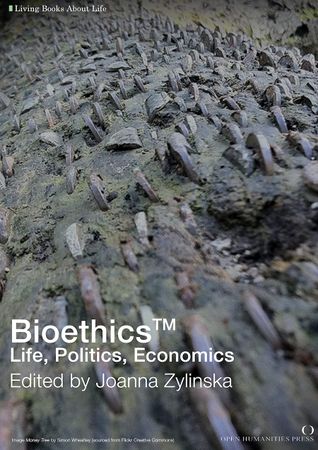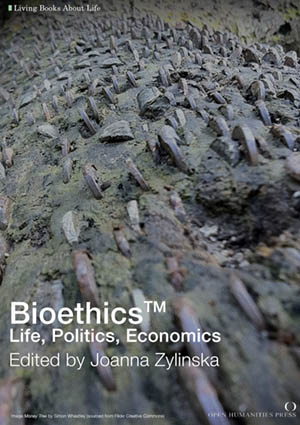Bioethics™: Difference between revisions
No edit summary |
|||
| Line 10: | Line 10: | ||
Bioethics is a serious business, in every sense of the word. A sub-domain of philosophy which deals with issues concerning life and health, it has to arbitrate not only over practical matters regarding patient care and medical experiments, but also over the very ontology of ‘life’: its manufacturing, patenting and redefinition in and by the biotech industry. Since bioethics functions as a node in the complex nexus of social, political and economic forces, it is perhaps not surprising that technocapitalism does not want to leave it just to philosophers. Instead, it mobilises a whole army of experts: morality salespeople, ethics technicians, value mathematicians, to help us decide on the price of life. Consequently, bioethics increasingly abandons its more daring ambitions and responsibilities -- such as exploring the metaphysics of life or the politics of everyday survival -- to serve instead as just a ‘technical discourse about values clarification and choice’ (Haraway, 2007: 109). Its methods of working are thus principally procedural, akin to ‘facts and hypothesis testing’ in science (Haraway, 2007: 109). Feminist thinker Donna Haraway points out that medical ethics ‘is now a literal industry, funded directly by the new developments in technoscience. Ethics experts have become an indispensable part of the apparatus of technoscience-production’ (2007: 109). To put it crudely, bioethics’ role is often to get biotech corporations off the hook -- although, of course, it has the potential to be much more than that. Indeed, in its engagement with life in both a metaphysical and material sense, bioethics is conceivably one of the most exciting areas of philosophical interrogation and artistic experimentation today. <br> <br> Designed as a supplement to my 2009 book, [http://mitpress.mit.edu/catalog/item/default.asp?ttype=2&tid=11759 ''Bioethics in the Age of New Media''] -- which explores and experiments with some alternatives within and for bioethics -- this living book, ''Bioethics™: Life, Politics, Economics'', is to act as a warning against the foreclosure of the aforementioned potential by casting light on the increasing marketisation of both life and bioethics under late capitalism. Performed as a form of ‘mutation’, the introduction presented here outlines an academic-artistic method for ''reading and writing as genetic recombination'', which can perhaps be seen as a biotech-era take on Roland Barthes’ [http://evans-experientialism.freewebspace.com/barthes05.htm ‘From Work to Text’]. ([http://www.livingbooksaboutlife.org/books/Bioethics/Introduction more]) | Bioethics is a serious business, in every sense of the word. A sub-domain of philosophy which deals with issues concerning life and health, it has to arbitrate not only over practical matters regarding patient care and medical experiments, but also over the very ontology of ‘life’: its manufacturing, patenting and redefinition in and by the biotech industry. Since bioethics functions as a node in the complex nexus of social, political and economic forces, it is perhaps not surprising that technocapitalism does not want to leave it just to philosophers. Instead, it mobilises a whole army of experts: morality salespeople, ethics technicians, value mathematicians, to help us decide on the price of life. Consequently, bioethics increasingly abandons its more daring ambitions and responsibilities -- such as exploring the metaphysics of life or the politics of everyday survival -- to serve instead as just a ‘technical discourse about values clarification and choice’ (Haraway, 2007: 109). Its methods of working are thus principally procedural, akin to ‘facts and hypothesis testing’ in science (Haraway, 2007: 109). Feminist thinker Donna Haraway points out that medical ethics ‘is now a literal industry, funded directly by the new developments in technoscience. Ethics experts have become an indispensable part of the apparatus of technoscience-production’ (2007: 109). To put it crudely, bioethics’ role is often to get biotech corporations off the hook -- although, of course, it has the potential to be much more than that. Indeed, in its engagement with life in both a metaphysical and material sense, bioethics is conceivably one of the most exciting areas of philosophical interrogation and artistic experimentation today. <br> <br> Designed as a supplement to my 2009 book, [http://mitpress.mit.edu/catalog/item/default.asp?ttype=2&tid=11759 ''Bioethics in the Age of New Media''] -- which explores and experiments with some alternatives within and for bioethics -- this living book, ''Bioethics™: Life, Politics, Economics'', is to act as a warning against the foreclosure of the aforementioned potential by casting light on the increasing marketisation of both life and bioethics under late capitalism. Performed as a form of ‘mutation’, the introduction presented here outlines an academic-artistic method for ''reading and writing as genetic recombination'', which can perhaps be seen as a biotech-era take on Roland Barthes’ [http://evans-experientialism.freewebspace.com/barthes05.htm ‘From Work to Text’]. ([http://www.livingbooksaboutlife.org/books/Bioethics/Introduction more]) | ||
== <br> ''' | == <br> '''Th Business of Bioethics''' == | ||
Carl Elliott<br> [http://prospect.org/cs/articles?article=american_bioscience_meets_the_american_dream American Bioscience Meets the American Dream] | Carl Elliott<br> [http://prospect.org/cs/articles?article=american_bioscience_meets_the_american_dream American Bioscience Meets the American Dream] | ||
Revision as of 08:41, 1 September 2011

Bioethics™: Life, Politics, Economics
edited by Joanna Zylinska
Introduction: Bioethical Mutations in the Age of Capital
Bioethics is a serious business, in every sense of the word. A sub-domain of philosophy which deals with issues concerning life and health, it has to arbitrate not only over practical matters regarding patient care and medical experiments, but also over the very ontology of ‘life’: its manufacturing, patenting and redefinition in and by the biotech industry. Since bioethics functions as a node in the complex nexus of social, political and economic forces, it is perhaps not surprising that technocapitalism does not want to leave it just to philosophers. Instead, it mobilises a whole army of experts: morality salespeople, ethics technicians, value mathematicians, to help us decide on the price of life. Consequently, bioethics increasingly abandons its more daring ambitions and responsibilities -- such as exploring the metaphysics of life or the politics of everyday survival -- to serve instead as just a ‘technical discourse about values clarification and choice’ (Haraway, 2007: 109). Its methods of working are thus principally procedural, akin to ‘facts and hypothesis testing’ in science (Haraway, 2007: 109). Feminist thinker Donna Haraway points out that medical ethics ‘is now a literal industry, funded directly by the new developments in technoscience. Ethics experts have become an indispensable part of the apparatus of technoscience-production’ (2007: 109). To put it crudely, bioethics’ role is often to get biotech corporations off the hook -- although, of course, it has the potential to be much more than that. Indeed, in its engagement with life in both a metaphysical and material sense, bioethics is conceivably one of the most exciting areas of philosophical interrogation and artistic experimentation today.
Designed as a supplement to my 2009 book, Bioethics in the Age of New Media -- which explores and experiments with some alternatives within and for bioethics -- this living book, Bioethics™: Life, Politics, Economics, is to act as a warning against the foreclosure of the aforementioned potential by casting light on the increasing marketisation of both life and bioethics under late capitalism. Performed as a form of ‘mutation’, the introduction presented here outlines an academic-artistic method for reading and writing as genetic recombination, which can perhaps be seen as a biotech-era take on Roland Barthes’ ‘From Work to Text’. (more)
Th Business of Bioethics
Carl Elliott
American Bioscience Meets the American Dream
Jocelyn E. Mackie, Andrew D. Taylor, David L. Finegold, Abdallah S. Daar, Peter A. Singer
Lessons on Ethical Decision Making from the Bioscience Industry
Carlos Novas
What Is the Bioscience Industry Doing to Address the Ethical Issues It Faces?
Ezekiel J Emanuel, Trudo Lemmens, Carl Elliott
Should Society Allow Research Ethics Boards to Be Run As For-Profit Enterprises?
The Commercialization of Medical Research and Patient Care
T Lemmens, PB Miller
Regulating the Market in Human Research Participants
Aaron S. Kesselheim, Michelle M. Mello, David M. Studdert
Strategies and Practices in Off-Label Marketing of Pharmaceuticals: A Retrospective Analysis of Whistleblower Complaints
Adriane J. Fugh-Berman
The Haunting of Medical Journals: How Ghostwriting Sold “HRT”
Ben Goldacre
The True Purpose of a Drug Trial Is Not Always Obvious
Marcia Angell
The Epidemic of Mental Illness: Why? and The Illusions of Psychiatry
David Henry
Doctors and Drug Companies: Still Cozy after All These Years
Biomanufacturing and Biopatenting
Antony Taubman
The International Patent System and Biomedical Research: Reconciling Aspiration, Policy and Practice
Arti Rai, James Boyle
Synthetic Biology: Caught between Property Rights, the Public Domain, and the Commons
Paul Rabinow, Gaymon Bennett
Synthetic Biology: Ethical Ramifications 2009
Joanna Zylinska
Playing God, Playing Adam: The Politics and Ethics of Enhancement
The Body as Property, Commodity and Gift
Tarif Bakdash, Nancy Scheper-Hughes
Is It Ethical for Patients with Renal Disease to Purchase Kidneys from the World's Poor?
Mark Schweda, Silke Schicktanz
The "spare parts person"? Conceptions of the Human Body and Their Implications for Public Attitudes towards Organ Donation and Organ Sale
Antonia J Cronin, David Price
Directed Organ Donation: Is the Donor the Owner?
Howard Wolinsky
The Thousand-Dollar Genome. Genetic Brinkmanship or Personalized Medicine?
Global Health Inc.
Robert Mitchell, Catherine Waldby
National Biobanks: Clinical Labor, Risk Production, and the Creation of Biovalue
Kammerle Schneider, Laurie Garrett
The End of the Era of Generosity? Global Health amid Economic Crisis
Jacquineau Azétsop, Stuart Rennie
Principlism, Medical Individualism, and Health Promotion in Resource-poor Countries: Can Autonomy-based Bioethics Promote Social Justice and Population Health?
Stuart Rennie, Bavon Mupenda
Living Apart Together: Reflections on Bioethics, Global Inequality and Social Justice
The Art of Life Between Speculation and Appreciation
Ionat Zurr, Oron Catts
Big Pigs, Small Wings: On Genohype and Artistic Autonomy
Adam Zaretsky
The Workhorse Zoo Art and Bioethics Quiz
Critical Art Ensemble
The Flesh Machine
Joanna Zylinska
If It Reads, It Bleeds; 3' video, 2010
************************************************************************************************************************
To download a pdf version of this living book (in a slightly different incarnation), please right-click here, click on 'Save Link As' ('Download Linked File' on a Mac) and save it on your computer. It's quite a large file - 15MB, so downloading it onto your computer will take far less time than trying to open the pdf directly from its current location. However, if you prefer to just read it online, click here.

